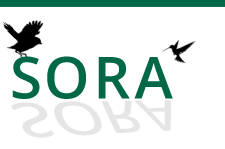A Deplumed Pileated Woodpecker
Online Full Text
A Deplnmed Pileated Woodpecker.-In front of my residence on the shore of Okanagan Lake is a grove of cottonwoods which are infested with the large larvae of the goat moth (Cossus) . These attract many woodpeckers, occasionally the big Pileated (Ceophloew pileatus).
On February 5, 1944, I heard the extra loud strokes which indicated that one of these was at work. When I saw him, his appearance was astonishing as he had been denuded of feathers on his back and breast; a few tufts of scanty down remained together with one feather of the dorsal tract. The damage had been done some time before, as the scapulars were commencing to grow again and showed.as a long line of black points. Although the temperature was down to 20’ F. he did not seem to be suffering.
I have no doubt that he had been in the clutches of a hawk, most likely a Goshawk, and had escaped after being partially plucked. Usually these big, tough woodpeckers are not attacked by hawks; the only record I have of one being killed by a hawk was a bird taken by a Red-tail.
It would be hard to believe that a bird could survive such an ordeal for the length of time it would .take a hawk to deplume it if I had not once seen a Bald Eagle on the topmost branches of an enormous dead tir completely deplume an adult male Golden-eye; only the feathers of the head and wings were unplucked. The duck was in the clutches of the eagle for at least twenty minutes, yet when I fired at the eagle with a .22 rifle the duck flew off and made for the nearest water, an extraordinary sight. The snow beneath the tree was littered not only with feathers but also with many strips and fragments of bloody skin with the feathers attached.
For the next two weeks I frequently saw the luckless victim sitting beside small fresh-water pools some distance from the seashore, but I do not think it survived. I could recount many other instances which disprove the general conception that predators always kill their prey as soon as captured.-ALLAN BROOKS, Okanagan Landing, British Columbia, February 11,1944.
Creative Commons License
Recommended Citation
Brooks, Allan
(1944)
"A Deplumed Pileated Woodpecker,"
Condor: Vol. 46
:
Iss.
3
, Article 9.
Available at:
https://digitalcommons.usf.edu/condor/vol46/iss3/9

